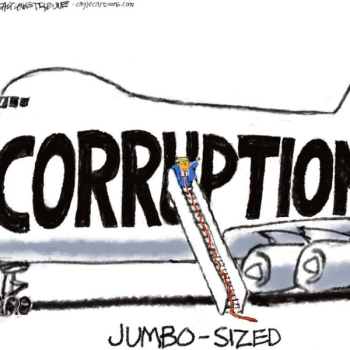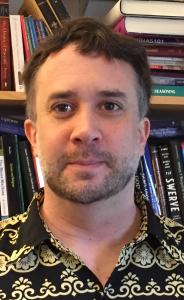 Should the public theologian develop a scientifically informed Theology of Nature? Yes, indeed. Should astrobiology inform astrotheology? Yes, indeed. Should astrotheology inform public theology? Yes, indeed.
Should the public theologian develop a scientifically informed Theology of Nature? Yes, indeed. Should astrobiology inform astrotheology? Yes, indeed. Should astrotheology inform public theology? Yes, indeed.
No one is better equipped than Lucas Mix to develop a theology of creation informed at the microlevel by biology and the macro level by astronomy. Mix is a hybrid astrobiologist and theologian. Even Doctor Spock learns from Doctor Mix about life in the universe.
This is a subtle matter. Outer space evokes our religious sensibilities. Politicians with a lust for power will exploit these religious sensibilities. The public theologian must be careful in negotiating genuine scientific knowledge with misdirected political and even spiritual hopes. Lucas Mix is just the person to provide sober deliberative leadership.
Are NASA and Priests Preparing for ETI Contact?
Recall the recent news splash about NASA paying priests for advice on astrobiology? Recall the confusion we tried to straighten out here in our Patheos blog? Would you like the facts?
It was an interview with Andrew Davison at the University of Cambridge that sparked all the hub bub. And, the misunderstandings. The misunderstandings were due to the press, not to Professor Davison. Right here in this column post, Lucas Mix tells us what actually happened as well as what we can expect in the future.
Meet Lucas Mix
Lucas Mix studies life-concepts at the intersection of biology, philosophy, and theology. He currently serves as project coordinator for Equipping Christian Leadership in an Age of Science, a project at Durham University that connects senior church leaders with world-class science. He holds a PhD in biology (Harvard, 2004) and an MDiv (Church Divinity School of the Pacific, 2007). A priest in the Episcopal Church, he has served as an inner-city pastor and college chaplain as well as an academic. You can read his essays, sermons, and poetry and find out more at his blog.
All the Space Around Us
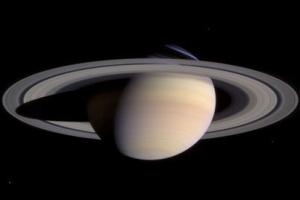 LUCAS MIX. Space is in the air – if you’ll forgive the pun – with a rover on Mars, the unfurling of the new James Webb Space Telescope [which takes us beyond Hubble], and billionaires rocketing through the ozone. Recent reports have included rumors about NASA hiring priests to prepare for first contact. As Ted shared in an earlier post, theologians did gather at Princeton a few years back to discuss astrobiology. I consider Ted Peters to be one of the leaders in astrotheology. Now, because I was lucky enough to be present, Ted asked me to share my own reflections and fill you in on the details. To sum up, the work was academic in character, included diverse participants, and favored current research over speculation.
LUCAS MIX. Space is in the air – if you’ll forgive the pun – with a rover on Mars, the unfurling of the new James Webb Space Telescope [which takes us beyond Hubble], and billionaires rocketing through the ozone. Recent reports have included rumors about NASA hiring priests to prepare for first contact. As Ted shared in an earlier post, theologians did gather at Princeton a few years back to discuss astrobiology. I consider Ted Peters to be one of the leaders in astrotheology. Now, because I was lucky enough to be present, Ted asked me to share my own reflections and fill you in on the details. To sum up, the work was academic in character, included diverse participants, and favored current research over speculation.
The Details: Did NASA really pay priests?
LUCAS MIX. Formally, we are talking about the “Inquiry into the Societal Implications of Astrobiology” held by Princeton’s Center of Theological Inquiry (CTI). NASA and the John Templeton Foundation (JTF) funded the inquiry, which included multiple programs between 2015 and 2018, but CTI’s director, William Storrar, chose the participants based on their academic work. (Neither NASA nor JTF hired anyone directly. Most were professors at universities, though a few of us happened to be ministers as well.)
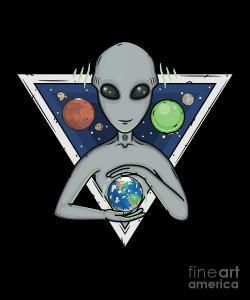 CTI hosted 25 scholars in two 9-month residential fellowships to learn more about the science and study its implications for society. Scholars in theology and related fields (e.g., Old Testament, ethics) were joined by three secular philosophers, a cultural anthropologist, an English professor, and a business professor.
CTI hosted 25 scholars in two 9-month residential fellowships to learn more about the science and study its implications for society. Scholars in theology and related fields (e.g., Old Testament, ethics) were joined by three secular philosophers, a cultural anthropologist, an English professor, and a business professor.
Each year also included one academic biologist specializing in astrobiology. A “Consultation on Astrobiology and World Religions” brought in Islamic, Hindu, Buddhist, and Taosist scholars to address issues in their own traditions. In addition to research, the scholars met weekly to collaborate and regularly interacted with scientists from Princeton and the broader research community. Week-long workshops for emerging scholars (grad-students and post-docs) brought in 14 more investigators from around the world to engage in the discussion.
Extra-Terrestrial Intelligence
LUCAS MIX. When we talk about astrobiology, most people think immediately of contacting intelligent aliens. As exciting as that possibility is, it remains speculative. And there is so much we already know about life in the cosmos.
Astrobiology is a scientific investigation into the origin, extent, and future of life in the universe. This includes a rapidly expanding catalogue of extrasolar planets and strange forms of life here on Earth as well as the exploration of nearby planets, moons, asteroids, and comets. Astrobiologists try to fill the gaps between astronomy, geology, chemistry, and biology to produce a unified view of life.
The inquiry asked how this research shapes the way we see ourselves and our place in the universe. That means we did speculate on occasion, but mostly we talked about things known and knowable in the near future. What can we say about life and intelligence based on life-as-we-know-it? And what can we do concretely to expand that knowledge?
Did the Princeton astrobiology project have an impact?
LUCAS MIX. NASA and the astrobiology community reacted to the proceedings much the way they usually respond to scholarship. They waited for careful research and peer review and then processed the outputs through new research priorities, mission planning, and continued conversation. CTI fellows have gone on to work with NASA on other projects and have taken their findings back to local communities – academic and religious. A few academic outcomes stood out for me as particularly interesting.
Two participants wrote excellent books on astrobiology and theology. Olli-Pekka Vainio, a lecturer in Systematic Theology at the University of Helsinki, wrote Cosmology in Theological Perspective (Baker Academic, 2018), which I consider to be the best current book on the subject. Adam Pryor, Associate Professor of Religion at Bethany College, wrote a narrower book on humanity as the image of God in the Anthropocene: Living with Tiny Aliens (Forham, 2020). (My review provides a summary and some reflections.)
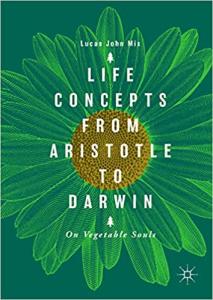 I’m also happy to recommend the amazing work of Erik Persson, Reader in Practical Philosophy at Lund University. No book, yet, but numerous articles of interest reflecting strong engagement with the science and scientists. Andrew Davison, Associate Professor of Divinity and Natural Sciences at Cambridge will release another book on the topic in the coming year. (Press releases likely started the current spate of stories about NASA hiring priests.)
I’m also happy to recommend the amazing work of Erik Persson, Reader in Practical Philosophy at Lund University. No book, yet, but numerous articles of interest reflecting strong engagement with the science and scientists. Andrew Davison, Associate Professor of Divinity and Natural Sciences at Cambridge will release another book on the topic in the coming year. (Press releases likely started the current spate of stories about NASA hiring priests.)
The time also supported related work, centered in other fields, but important for future astrobiology research. Philosopher Susan Schneider went on to become the Blumberg Chair in Astrobiology at the Library of Congress before founding the Center for Future Mind at Florida Atlantic University. Her books explore the relationship between science fiction and philosophy and look carefully at the meaning of “consciousness” in the age of AI. Theologian Joanna Leidenhag, now a lecturer at Leeds, has written Minding Creation (Bloomsbury, 2020) dealing with doctrines of creation and how they reflect the relationship between mind and matter.
Tell us about Lucas Mix’s scholarly work
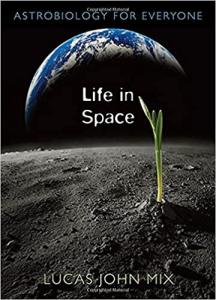 LUCAS MIX. I can’t pass by without mentioning my own work in the area. I’ve been involved in astrobiology since 1996. My doctorate in is in evolutionary theory, but my main contributions have involved getting people to work together across disciplines. I spent a decade just within the sciences – you’d be amazed how hard it is to communicate between astronomy and biology. My book on astrobiology science came out in 2009: Life in Space: Astrobiology for Everyone (Harvard Press).
LUCAS MIX. I can’t pass by without mentioning my own work in the area. I’ve been involved in astrobiology since 1996. My doctorate in is in evolutionary theory, but my main contributions have involved getting people to work together across disciplines. I spent a decade just within the sciences – you’d be amazed how hard it is to communicate between astronomy and biology. My book on astrobiology science came out in 2009: Life in Space: Astrobiology for Everyone (Harvard Press).
For the past decade, I’ve worked to bring in other fields. I helped to draft NASA’s 2015 Astrobiology Strategy document, including co-authoring an appendix on the role of social sciences and humanities. After helping translate between scientists and humanities scholars at CTI, I wrote a few articles on astrobiology, philosophy, and theology as well as developing my own research into the deep history of definitions of life – running from Aristotle’s vegetable souls to modern ideas about replication and metabolism: Life Concepts from Aristotle to Darwin: On Vegetable Souls (Palgrave, 2018).
Congratulations, Lucas, on sitting in the Blumberg Chair!
LUCAS MIX. I followed Susan as the Blumberg Chair at the Library of Congress, where my work has focused on narratives of ascent, physical and spiritual, and how they’re related. That work will appear over the next couple years, including (I hope) a popular book. A few other works related to astrobiology and theology appear below.
Do astrobiology and astrotheology matter?
LUCAS MIX. If I had to pick one take-home from all of this, it would be that space is all around us. The Copernican Revolution changed earth (the element and the area of human habitation) into the Earth (a planet in space). It reminded us that we are very local and part of a very large cosmos. While this may offend against our sense of self-importance, it agrees well with Biblical Christianity. The birth of Jesus in the remote outskirts of Rome, the hinterlands even for Judea, tells us something about God’s care for the outcast.
Jesus was not born to a physical or social centrality, but he changed the cosmos by his incarnation, passion, and resurrection. Humanity, as well, finds our significance not in the accident of our birth – at the center of the cosmos or the apex of nature – but in our action. If we are saved, it is by grace alone. And if we are sanctified, it comes through lives that follow his and not just bodies that share the same DNA.
The interconnectedness of all things
LUCAS MIX. Astrobiology reminds us that the fundamental interconnectedness of all things – our minds and souls are embedded in a web of life, of chemistry, of geology, and even astronomy. God’s spirit moved the dust in creation and moves us in our very souls – and thus it is Christ in me that is alive. Alone I am dust. Any scrap of knowledge that reminds me of my earthliness, my grounding in the dust and that puff of divine breath I share with my neighbor, is useful knowledge.
I am deeply grateful for my 9 months in Princeton, for the conversations, and the time to study. It has made me more aware of God’s work in the world. It has reinforced my commitment to help people communicate about theology, natural science, and the world we share.
The Society for Ordained Scientists (SOSc)
LUCAS MIX. Speaking of priests, I would love to mention another group that Ted and I are part of – the Society of Ordained Scientists (SOSc). While CTI and many other groups focus on academic relations between science and religion, SOSc provides a spiritual home for ministers who bridge the gap, holding authority in both areas. Most of us are priests with PhDs. Part our purpose is to provide a space for conversation and mutual support. What does it mean to represent both a church community and a research community? How are we called to integrate the two? There is a deeper level, however. We believe that faith and reason permeate every aspect of our lives. We vow to pray for one another daily, to make our research a form of praise and service, and to witness to the good news of God in creation.
The SOSc was founded by a small group of priest-scientists in the Church of England, including two theologians famous for their engagement with science: Arthur Peacocke and John Polkinghorne. Over the years, the Society has expanded to include over 200 people, worldwide, including scientists from many branches of the church. We support one another in witness to the importance of a scientifically informed theology of nature and to reasoning critically and communally about the world. Roughly 1/3 of the Society is in North America, where I had the joy to serve as provincial warden from 2014 to 2020. I was succeeded by another astrobiologist, Pan Conrad, who is active as a pastor and Mars rover mission scientist. (If you think you might be interested in joining as a member or associate, check out the website for details.)”
William Storrar: Public Theologian
TED PETERS AGAIN. What is astrotheology’s contribution to public theology?
Patheos readers should know that the CTI program was directed by a public theologian. He is William Storrar. Storrar inspiringly writes, “The public paradigm of mission is held together by this theological conviction that we are called to hold together our identity in Christ with openness to the work of the Spirit in the strangers we encounter in the public sphere” (Storrar 2011, 33).
“Openness to the work of the Spirit in the strangers we encounter in the public sphere,” says Storrar. I certainly hope this public sphere includes ET.
Conclusion
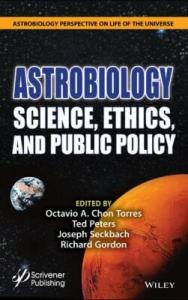 The team of scientists and theologians associated with the Center for Theology and the Natural Sciences (CTNS) in Berkeley, California, have been engaged in astrobiology, astrotheology and astroethics for a decade now. Here is my working definition.
The team of scientists and theologians associated with the Center for Theology and the Natural Sciences (CTNS) in Berkeley, California, have been engaged in astrobiology, astrotheology and astroethics for a decade now. Here is my working definition.
Christian Astrotheology is that branch of theology which provides a critical analysis of the contemporary space sciences combined with an explication of classic doctrines such as creation and Christology for the purpose of constructing a comprehensive and meaningful understanding of our human situation within an astonishingly immense cosmos. (T. Peters, Astrotheology 2013, 838)
This term, astrotheology, replaces an earlier term, exotheology. This parallels NASA’s vocabulary change from exobiology to astrobiology in the 1990s. Along with the respected science of astrobiology, the public theologian must also interpret the cultural implications of UFOs and ancient alien theorists.
Not every public theologian needs to specialize in the creative mutual interaction between astrobiology and astrotheology. Nevertheless, it is important, I believe, that each public theologian develop a scientifically informed Theology of Nature. Why? Both nature and the scientific interpretation of nature are public. Very public.
▓
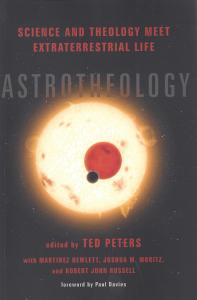 Along with Martinez Hewlett, Joshua Moritz, and Robert John Russell, Ted Peters co-edited, Astrotheology: Science and Theology Meet Extraterrestrial Intelligence (2018). Along with Octavio Chon Torres, Joseph Seckbach, and Russell Gordon, he co-edited, Astrobiology: Science, Ethics, and Public Policy (Scrivener 2021). He is also author of UFOs: God’s Chariots? Spirituality, Ancient Aliens, and Religious Yearnings in the Age of Extraterrestrials (Career Press New Page Books, 2014). See his website: TedsTimelyTake.com.
Along with Martinez Hewlett, Joshua Moritz, and Robert John Russell, Ted Peters co-edited, Astrotheology: Science and Theology Meet Extraterrestrial Intelligence (2018). Along with Octavio Chon Torres, Joseph Seckbach, and Russell Gordon, he co-edited, Astrobiology: Science, Ethics, and Public Policy (Scrivener 2021). He is also author of UFOs: God’s Chariots? Spirituality, Ancient Aliens, and Religious Yearnings in the Age of Extraterrestrials (Career Press New Page Books, 2014). See his website: TedsTimelyTake.com.
▓
Bibliography
Mix, LJ. 2022. Decoupling Physical and Spiritual Ascent Narratives in Astronomy and Biology. In: Charles Cockell, The Institutions of Extraterrestrial Liberty. London: Oxford University Press.
Mix, LJ. 2020. Three lives in astrobiology. In: K Smith and C Mariscal, Social and Conceptual Issues in Astrobiology, pp. 57-78. New York: Oxford University Press.
Mix, LJ. 2017. Philosophy and data in astrobiology. International Journal of Astrobiology. 17(2): 189-200.
Mix, LJ. 2016. Life-value narratives and the impact of astrobiology on Christian ethics. Zygon 51(2): 520-535.
Peters, Ted. 2013. "Astrotheology." In The Routledge Companion to Modern Christian Thought, by eds Chad Meister and James Beilby, 838-853. London: Routledge.
Peters, Ted. 2021. “Astrotheology’s contribution to public theology: From the extraterrestrial intelligence myth to Astroethics.” HTS Teologeise Studies 77:3 1-8.
Peters, Ted. 2018. “Introducing Astrotheology.” In Astrotheology: Science and Theology Meet Extraterrestrial Life, by Martinez Hewlett, Joshua M Moritz, and Robert John Russell, eds Ted Peters, 3-26. Eugene OR: Cascade Books.
Peters, Ted, et.al., eds. 2018. Astrotheology: Where Science and Theology Meet ETI. Eugene OR: Cascade Books.
Storrar, William. 2011. “The Naming of Parts: Doing Public Theology in a Global Era.” International Journal of Public Theology 5 23-43.







